Exit Interview Questionnaire05-26
人力资源管理师专业英文词汇
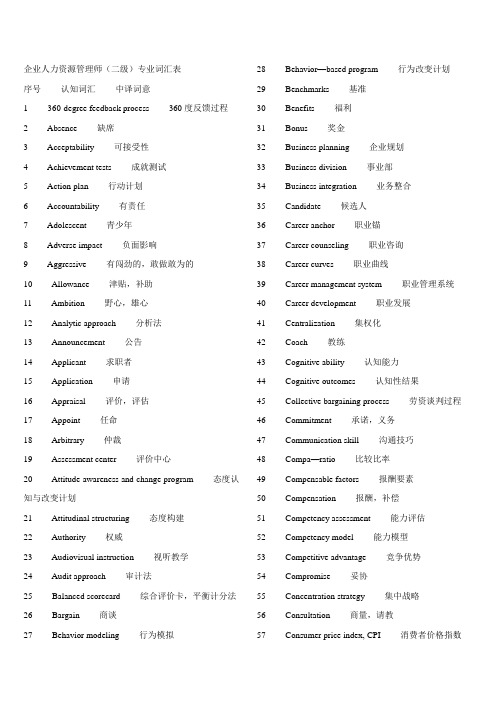
企业人力资源管理师(二级)专业词汇表序号认知词汇中译词意1 360-degree feedback process 360度反馈过程2 Absence 缺席3 Acceptability 可接受性4 Achievement tests 成就测试5 Action plan 行动计划6 Accountability 有责任7 Adolescent 青少年8 Adverse impact 负面影响9 Aggressive 有闯劲的,敢做敢为的10 Allowance 津贴,补助11 Ambition 野心,雄心12 Analytic approach 分析法13 Announcement 公告14 Applicant 求职者15 Application 申请16 Appraisal 评价,评估17 Appoint 任命18 Arbitrary 仲裁19 Assessment center 评价中心20 Attitude awareness and change program 态度认知与改变计划21 Attitudinal structuring 态度构建22 Authority 权威23 Audiovisual instruction 视听教学24 Audit approach 审计法25 Balanced scorecard 综合评价卡,平衡计分法26 Bargain 商谈27 Behavior modeling 行为模拟28 Behavior—based program 行为改变计划29 Benchmarks 基准30 Benefits 福利31 Bonus 奖金32 Business planning 企业规划33 Business division 事业部34 Business integration 业务整合35 Candidate 候选人36 Career anchor 职业锚37 Career counseling 职业咨询38 Career curves 职业曲线39 Career management system 职业管理系统40 Career development 职业发展41 Centralization 集权化42 Coach 教练43 Cognitive ability 认知能力44 Cognitive outcomes 认知性结果45 Collective bargaining process 劳资谈判过程46 Commitment 承诺,义务47 Communication skill 沟通技巧48 Compa—ratio 比较比率49 Compensable factors 报酬要素50 Compensation 报酬,补偿51 Competency assessment 能力评估52 Competency model 能力模型53 Competitive advantage 竞争优势54 Compromise 妥协55 Concentration strategy 集中战略56 Consultation 商量,请教57 Consumer price index, CPI 消费者价格指数58 Continuous learning 持续学习59 Coordination training 合作培训60 Core competencies 核心竞争力61 Cost structure 成本结构62 Critical incident method 关键事件法63 Cross—cultural preparation 跨文化准备64 Cross—training 交叉培训65 Cultural environment 文化环境66 Cultural shock 文化冲击67 Customer appraisal 顾客评估68 CV (curriculum vitae)简历69 Data flow diagram 数据流程图70 Decentralization 分散化71 Decision making 决策72 Decision support systems 决策支持系统73 Deficiency 缺乏74 Defined-benefit plan 养老金福利计划75 Defined-contribution plan 资方养老金投入计划76 Delayering 扁平化77 Demand forecasting 需求预测78 Depression 沮丧79 Development planning system 开发规划系统80 Differential piece rate 差额计件工资81 Direct costs 直接成本82 Discipline 纪律83 Disparate impact 差别性影响84 Disparate treatment 差别性对待85 Diversity training 多元化培训86 Dividends 红利87 Discrimination 歧视88 Dismiss 开除,解雇89 Downsizing 精简90 Downward move 降级91 Efficiency wage theory 效率工资理论92 Egalitarian 平等主义93 Earnings 所得,收入94 Efficiency 效率95 Employee empowerment 员工授权96 Employee leasing 员工租借97 Employee survey research 雇员调查与研究98 Entrepreneur 企业家99 Equal employment opportunity (EEO) 公平就业机会100 Ethics 道德101 Exit interview 离职面谈102 Expatriate 外派雇员103 Expert systems 专家系统104 Explicit knowledge 显性知识105 External analysis 外部分析106 External growth strategy 外边成长战略107 External labor market 外部劳动力市场108 Face to face discussion 当面讨论109 Factor comparison system 因素比较法110 Feedback 反馈111 Flat hourly rate 小时工资率112 Flexible benefits plans (cafeteria plans) 灵活的福利计划(自助福利方案)113 Flextime 灵活的时间114 Flowchart 流程图115 Follow up 跟随,追随116 Formal education programs 正规教育计划117 Frame of reference 参照系118 Functional job analysis, FJA 职能工作分析119 Gain sharing plans 收益分享计划120 Globalization 全球化121 Goals and timetables 目标和时间表122 Graphic rating-scale method 图式评估法123 Grievance 委屈124 Group mentoring program 群体指导计划125 Guidelines 指导方针126 Head hunter 猎头127 Healthy and safety 健康安全128 Handover 工作交接129 High—performance work systems 高绩效工作系统130 Hourly work 计时工资制131 Human capital 人力资本132 Human resource information system (HRIS) 人力资源信息系统133 Human resource management 人力资源管理134 Human resources planning, HRP 人力资源计划135 Income 收入,收益136 Indirect costs 间接成本137 Individualism/collectivism 个人主义/集体主义138 Inflation 通货膨胀139 Input 投入140 Insurance 保险141 Intellectual asset 知识资产142 Internal analysis 内部分析143 Internal growth strategy 内部成长战略144 Internal labor force 内部劳动力145 Internet 互联网146 Internship programs 实习计划147 Interview 面试148 Industrialization 产业化149 IT(Information Technology)信息技术150 Invest 投资151 Job analysis 工作分析152 Job classification system 工作分类法153 Job description 工作描述154 Job design 工作设计155 Job enlargement 工作扩大化156 Job enrichment 工作丰富化157 Job evaluation 工作评价158 Job commitment 工作认同159 Job ranking system 工作重要性排序法160 Job rotation 工作轮换161 Job satisfaction 工作满意度162 Job specification 工作规范163 Joint venture company 合资公司164 Key performance indicator,KPI 关键业绩指标165 Labor relations process 劳动关系进程166 Leaderless group discussion 无领导小组讨论法167 Learning organization 学习型组织168 Line manager 直线经理169 Maintenance of membership 会员资格维持170 Management by objectives, MBO 目标管理171 Management forecasts 管理预测172 Management process 管理过程173 Manager appraisal 经理评估174 Managing diversity 管理多元化175 Manpower 人力,劳动力176 Material incentive 物质奖励177 Mediation 调解178 Mentor 导师179 Merit guideline 绩效指南180 Minimum wage 最低工资181 Morale 士气182 Mobility 流动性183 Motivation to learn 学习的动机184 Needs assessment (培训)需要评价185 Night shift 夜班186 Nonprofit organization 非营利组织187 Occupation 职业188 On-the—job training,OJT 在职培训189 Open culture 开放文化190 Opportunity to perform 实践的机会191 Organization desgin and development 组织设计与发展192 Organizational analysis 组织分析193 Organizational capability 组织能力194 Organiztion chart 组织结构图195 Organization code 组织代码196 Orientation 入职培训197 Outlay 费用198 Outplacement counseling 重新谋职咨询199 Output 产出200 Outsourcing 外包201 Overpay 超额工资202 Panel interview 小组面试203 Pay claim 加薪要求204 Pay grade 工资等级205 Pay structure 工资结构206 Pay—for—performance standard 按绩效的报酬标准207 Pay—policy line 工资政策线208 Payroll 职工薪水册209 Pension 养老金,退休金210 Peer appraisal 同事评估211 Pep talk 鼓舞动员谈话212 Performance appraisal 绩效评价213 Performance feedback 绩效反馈214 Performance management 绩效管理215 Performance planning and evaluation (PPE)绩效规划与评价系统216 Post 岗位,职位217 Potential 潜在的,可能的218 Priority 优先219 Probation 试用220 Person characteristics 个人特征221 Personnel selection 人员甄选222 Piecework 计件工资223 Position analysis questionnaire, PAQ 职位分析问卷调查224 Power distance 权力差距225 Predictive validation 预测效度226 Profit sharing 利润分享227 Promotion 晋升228 Psychological contract 心理契约229 Questionnaire 调查问卷230 Rapport 和谐,亲善231 Readability 易读性232 Readiness for training 培训准备233 Reasoning ability 推理能力234 Reconciliation 和解235 Recognition 认可,承认236 Recruitment 招募237 Redundancy 冗余238 Reengineering 流程再造239 Reference 参考240 Reject 拒绝,否决241 Reinstatement 复职242 Relational database 关联数据库243 Reliability 信度244 Remuneration 报酬245 Reputation 声誉,名声246 Retention plan (核心人员)保持计划247 Repatriation 归国准备248 Replacement charts 替换表249 Return on investment (ROI)投资回报250 Role ambiguity 角色模糊251 Role analysis technique 角色分析技术252 Role play 角色扮演253 Senior management 高级管理层254 Settlement 解决,决定255 Sick le口口e 病假256 Simulation 仿真,模拟257 Self—appraisal 自我评估258 Subcontracting 转包合同259 Substantive reason 客观存在因素260 Successor 后任261 Supply forecasting 供给预测262 Survey 调查263 Target 目标,目的264 Talent 才能,才干265 Sick note 病假条266 Situational interview 情景面试267 Skill inventories 技能量表268 Skill-based pay 技能工资269 Specificity 明确性270 Spot bonus 即时奖金271 Staffing tables 人员配置表272 Strategic choice 战略选择273 Strategic congruence 战略一致性274 Strategic human resource management 战略性人力资源管理275 Strategy formulation 战略形成276 Strategy implementation 战略执行277 Subordinate 下属278 Succession planning 可持续发展计划279 Tacit knowledge 隐形知识280 Task analysis 任务分析281 Team leader training 团队领导培训282 Team building 团队建设283 Top stratum 高层284 Termination 终止285 Total quality management (TQM) 全面质量管理286 Training administration 培训管理287 Training outcomes 培训结果288 Transaction processing 事务处理289 Trend analysis 趋势分析290 Turnover 离职,流动291 Utility analysis 效用分析292 Validity 效度293 Verbal comprehension 语言理解能力294 Vesting 既得利益295 V oicing 发言296 Wage and salary survey 薪资调查297 Wage freeze 冻结工资增长298 Web—based training 网上培训299 Welfare system 福利体系300 Work permit/ work certificate 就业许可证。
Exit Questionnair离职面谈 中英文
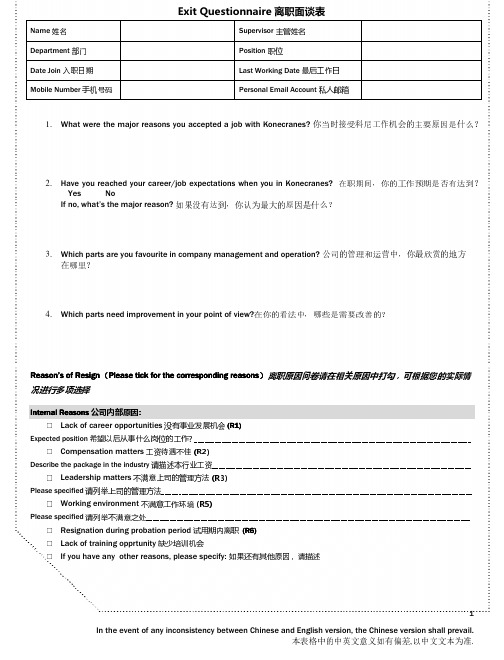
Exit QuestionnaireName Department Date Join Mobile Number Supervisor Position Last Working Date Personal Email Account1.2.3.4.Lack of career opportunitiesResignation during probation period Lack of training opprtunityIf you have any other reasons, please specify:In the event of any incon onsistency between Chinese and English version, the Chinese version shall prevail. he , .准为 本文文 中以 差偏 有如 义意文 英中的 中格表本 义意文 英中的 中格表本_______________________________________________________________________________________________ _______________________________________________________________________________________________Please specified)5R(Working environment______________________________________________________________________________________ ___________________________________________________________________________________________Please specified)3R(Leadership matters____________________________________________________________________________Describe the package in the industry)2R(Compensation matters______________________________________________________ _________________________________________________________________________________ ?Expected position:Internal Reasons(R1)(R6)) ) ) )Reason’s Please Reason’s of Resign Please tick for the corresponding reasons?的善 改要 需是些 哪,中 法看的你在 的善 改要 需是些 哪Which parts need improvement in your point of view?方地 的赏欣 最你, 中营运和 理管的司公 中营运和 理管的司公Which parts are you favourite in company management and operation??到 达有 否是期 预作工 的你,间期职在 间期职在?么 什是因 原的大最 为认 你,到 达有没果如 到 达有没果如Have you reached your career/job expectations when you in Konecranes? Yes No If no, what’s the major reason??么 什是 因原要 主的会 机作工尼 科受接时当你 尼 科受接1What were the major reasons you accepted a job with Konecranes?( ( ( (?里哪在□ □ □ □ □ □ □Found better job Deal in business Family reason Health reasonFurther educationWhat could Konecranes have done to prevent you from leaving• • • •Performing the same or similar type of work? Staying in the same industry? Receiving about the same pay?If no, please let us know your expected package ________________________________________________________reWould you like to re-join Koneranes in the future__ _ ___ __ ___ ___ ___ ___ __ ___ ____ _ __ _ ___ __ ___ ___ ___ ___ __ ___ ____ _Interview Date__ ___ ___ __ ___ ____□NoNot Sure___________________Yes, which dept and position:将你,作工的新份找寻你果如 :将你,作工的新份找寻你果如 :将你,作工的新份找寻你果如 :将你,作工的新份找寻你果如job, will If you have gone to another job, will you be:__________________________ __________________________Other reasons_________________Go abroadWhich country)4R( :Yes Yes Yes No No No Interviewer2External Reasons□ □ □ □ □ □ □□ □。
面试英语-26个求职者想反问HR的问题
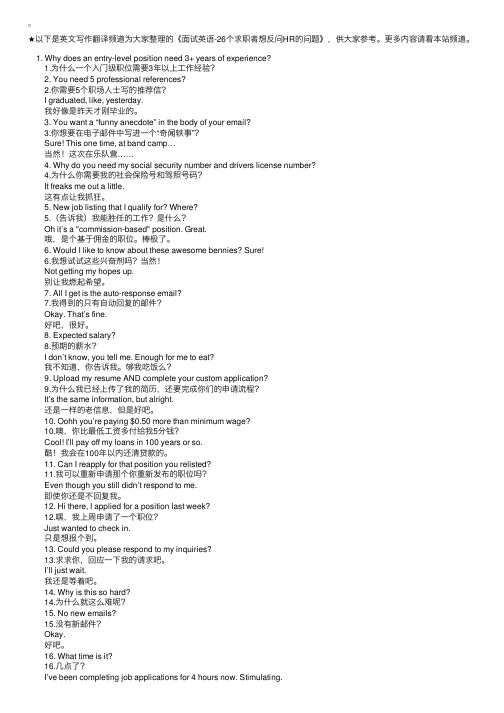
★以下是英⽂写作翻译频道为⼤家整理的《⾯试英语-26个求职者想反问HR的问题》,供⼤家参考。
更多内容请看本站频道。
1. Why does an entry-level position need 3+ years of experience? 1.为什么⼀个⼊门级职位需要3年以上⼯作经验? 2. You need 5 professional references? 2.你需要5个职场⼈⼠写的推荐信? I graduated, like, yesterday. 我好像是昨天才刚毕业的。
3. You want a “funny anecdote” in the body of your email? 3.你想要在电⼦邮件中写进⼀个“奇闻轶事”? Sure! This one time, at band camp… 当然!这次在乐队营…… 4. Why do you need my social security number and drivers license number? 4.为什么你需要我的社会保险号和驾照号码? It freaks me out a little. 这有点让我抓狂。
5. New job listing that I qualify for? Where? 5.(告诉我)我能胜任的⼯作?是什么? Oh it’s a "commission-based" position. Great. 哦,是个基于佣⾦的职位。
棒极了。
6. Would I like to know about these awesome bennies? Sure! 6.我想试试这些兴奋剂吗?当然! Not getting my hopes up. 别让我燃起希望。
7. All I get is the auto-response email? 7.我得到的只有⾃动回复的邮件? Okay. That’s fine. 好吧,很好。
英语面试结束前你最该问的四个问题
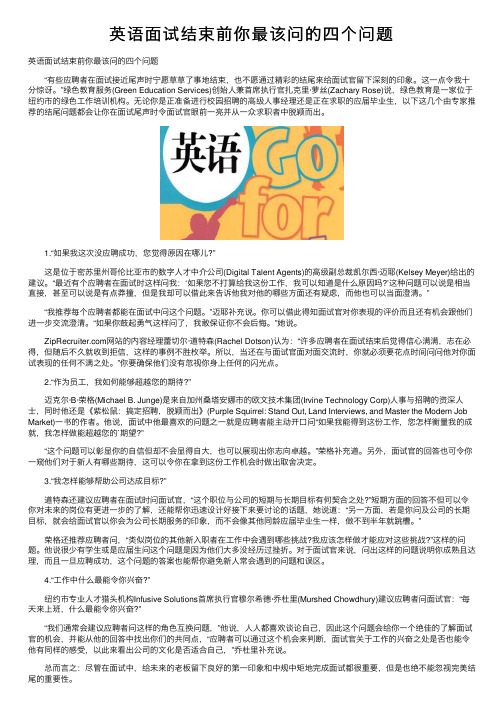
英语⾯试结束前你最该问的四个问题英语⾯试结束前你最该问的四个问题 “有些应聘者在⾯试接近尾声时宁愿草草了事地结束,也不愿通过精彩的结尾来给⾯试官留下深刻的印象。
这⼀点令我⼗分惊讶。
”绿⾊教育服务(Green Education Services)创始⼈兼⾸席执⾏官扎克⾥·萝丝(Zachary Rose)说,绿⾊教育是⼀家位于纽约市的绿⾊⼯作培训机构。
⽆论你是正准备进⾏校园招聘的⾼级⼈事经理还是正在求职的应届毕业⽣,以下这⼏个由专家推荐的结尾问题都会让你在⾯试尾声时令⾯试官眼前⼀亮并从⼀众求职者中脱颖⽽出。
1.“如果我这次没应聘成功,您觉得原因在哪⼉?” 这是位于密苏⾥州哥伦⽐亚市的数字⼈才中介公司(Digital Talent Agents)的⾼级副总裁凯尔西·迈耶(Kelsey Meyer)给出的建议。
“最近有个应聘者在⾯试时这样问我:‘如果您不打算给我这份⼯作,我可以知道是什么原因吗?’这种问题可以说是相当直接,甚⾄可以说是有点莽撞,但是我却可以借此来告诉他我对他的哪些⽅⾯还有疑虑,⽽他也可以当⾯澄清。
” “我推荐每个应聘者都能在⾯试中问这个问题。
”迈耶补充说。
你可以借此得知⾯试官对你表现的评价⽽且还有机会跟他们进⼀步交流澄清。
“如果你⿎起勇⽓这样问了,我敢保证你不会后悔。
”她说。
⽹站的内容经理蕾切尔·道特森(Rachel Dotson)认为:“许多应聘者在⾯试结束后觉得信⼼满满,志在必得,但随后不久就收到拒信,这样的事例不胜枚举。
所以,当还在与⾯试官⾯对⾯交流时,你就必须要花点时间问问他对你⾯试表现的任何不满之处。
”你要确保他们没有忽视你⾝上任何的闪光点。
2.“作为员⼯,我如何能够超越您的期待?” 迈克尔·B·荣格(Michael B. Junge)是来⾃加州桑塔安娜市的欧⽂技术集团(Irvine Technology Corp)⼈事与招聘的资深⼈⼠,同时他还是《紫松⿏:搞定招聘,脱颖⽽出》(Purple Squirrel: Stand Out, Land Interviews, and Master the Modern Job Market)⼀书的作者。
三级人力资源英语词汇

培训
• Coordination training合作培训 • Cross-training 交叉培训 • Diversity training 多元化培训 • On-the-job training, OJT 在职培训 • Readiness for training 培训准备 • Web-based training 网上培训 • Training administration 培训管理 • Training outcomes 培训结果 • Orientation 入职培训
反义词
• Explicit knowledge • Tacit knowledge • External analysis • Internal analysis • External growth strategy • Internal growth strategy • Exteranl labor market • Internal labor force
商量(讨论)等
• Consultation 商量,请教 • Face to face discussion 当面讨论 • Leaderless group discussion无领导小组讨
论法 • Mediation 调解
人员
• Announcement • Application • Arbitrary • Applicant • Authority • Candidate • Coach
…化
• Centralization 集权化 • Decentralization 分散化 • Delayering 扁平化 • Globalization 全球化 • Industrialization 产业化 • Job enlargement 工作扩大化 • Job enrichment 工作丰富化 • Managing diversity 管理多元化
Exit_Interview_Questionnaire05-26
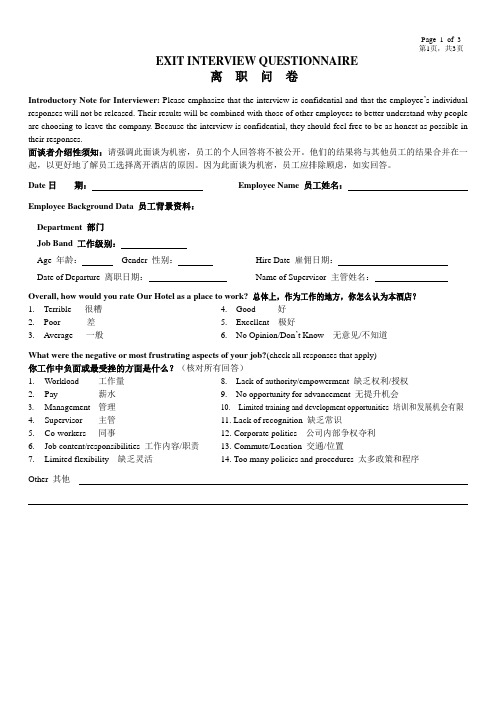
EXIT INTERVIEW QUESTIONNAIRE离职问卷Introductory Note for Interviewer: Please emphasize that the interview is confidential and that the employee’s individual responses will not be released. Their results will be combined with those of other employees to better understand why people are choosing to leave the company. Because the interview is confidential, they should feel free to be as honest as possible in their responses.面谈者介绍性须知:请强调此面谈为机密,员工的个人回答将不被公开。
他们的结果将与其他员工的结果合并在一起,以更好地了解员工选择离开酒店的原因。
因为此面谈为机密,员工应排除顾虑,如实回答。
Date日期:Employee Name 员工姓名:Employee Background Data 员工背景资料:Department 部门Job Band 工作级别:Age 年龄:Gender 性别:Hire Date 雇佣日期:Date of Departure 离职日期:Name of Supervisor 主管姓名:Overall, how would you rate Our Hotel as a place to work? 总体上,作为工作的地方,你怎么认为本酒店?1.Terrible 很糟 4. Good 好2.Poor 差 5. Excellent 极好3.Average 一般 6. No Opinion/Don’t Know 无意见/不知道What were the negative or most frustrating aspects of your job?(check all responses that apply)你工作中负面或最受挫的方面是什么?(核对所有回答)1.Workload 工作量8. Lack of authority/empowerment 缺乏权利/授权2.Pay 薪水9. No opportunity for advancement 无提升机会3.Management 管理10. Limited training and development opportunities 培训和发展机会有限4.Supervisor 主管11. Lack of recognition 缺乏常识5.Co-workers 同事12. Corporate politics 公司内部争权夺利6.Job content/responsibilities 工作内容/职责13. Commute/Location 交通/位置7.Limited flexibility 缺乏灵活14. Too many policies and procedures 太多政策和程序Other 其他What was your main reason or reasons for leaving the company?(Check all responses that apply)你离开本酒店的主要原因或原因是什么? (核对所有回答)1.Better opportunity elsewhere 别处更好的机会8. Dissatisfied with work hours/workload 对工作时间/工作量不满2.Limited advancement opportunities 提升机会有限9. Lack of recognition 缺乏常识3.Limited training/development opportunities培训和发展机会有限10. Limited empowerment/anthority to perform job开展工作的授权/权力有限4.Better pay 更好的薪水11. Dissatisfied with supervision 对监管不满5.Better benefits 更好的福利12. Company direction and strategy 公司方向/策略6.Family responsibilities(includes childcare and relocation) 13. Stress 压力家庭职责(包括照顾孩子和搬迁) 14. Dissatisfaction with job/work responsibilities 对工作/工作职责不满7.Eldercare responsibilities 照顾老人的职责15. Commute/Location交通/位置Other(please explain) 其他(请解释)Under what conditions would you have considered staying with Our Hotel?在什么条件下,你会考虑留在本酒店?1.More money 更多薪水 5. More flexibility/telecommuting options更多适应性2.Better benefits 更好的福利 6. Better hours/workload 更好的工作时间/工作量3.Advancement opportunity 提升机会7. Improved supervision 提高监管4.Improved training and development opportunities提高培训和发展机会8. More company stability 更多公司稳定性Other 其他Would you consider returning to Our Hotels Group? 你会考虑返回本酒店集团吗?1.No 否2. Yes 是3. Maybe 可能Overall, how would you rate your immediate supervisor?(Probe for more information if response is a 3 or below)总体上,你怎样看待你的直接上司?(如回答为3或3以下,探究更多信息)1.Terrible 很糟 4. Good 好2.Poor 差 5. Excellent 极好3.Average 一般 6. No Opinion/Don’t Know 无意见/不知道If you rated your supervisor as average or below, please explain why. 若你认为你的上司一般或还要差,请解释原因:How would you rate the pay you received? (Note: pay includes base pay and annual incentives)你怎样看待你的薪水?(附注:工资包括基本工资和年度激励)1.Terrible 很糟 4. Good 好2.Poor 差 5. Excellent 极好3.Average 一般 6. No Opinion/Don’t Know 无意见/不知道Do you think your pay was competitive with the market? 你认为你的薪水可与行情竞争吗?1.Yes 是2. No 否What do you think about the benefits you received? 你怎么看待你的福利?1.Terrible 很糟 4. Good 好2.Poor 差 5. Excellent 极好3.Average 一般 6. No Opinion/Don’t Know 无意见/不知道Page 3 of 3第3页,共3页Do you think your benefits package was competitive with packages offered by other companies?你认为你的福利可与其他酒店提供的福利竞争吗?1.Yes 是2. No 否How would you describe your workload at Our Hotel? 你怎样描述你在本酒店的工作量?1. Too little to do 太少2. About right 正常3. Too much to do 太多Were you able to maintain a satisfactory balance between work life and personal life?你能在工作和私人生活中保持满意的平衡吗?1.Yes 是2. No 否If no, please explain 如不能,请解释:What is your opinion of the opportunities for advancement at Our Hotel? 你认为在本酒店的提升机会怎么样?1.Terrible 很糟 4. Good 好2.Poor 差 5. Excellent 极好3.Average 一般 6. No Opinion/Don’t Know 无意见/不知道How would you rate your opportunities for training and career development while at Our Hotel?在本酒店工作期间,你怎样看待你的培训和事业发展机会?1.Terrible 很糟 4. Good 好2.Poor 差 5. Excellent 极好3.Average 一般 6. No Opinion/Don’t Know 无意见/不知道Wrap-up 综述What comments do you have for management about how to make improvements in your work group, department, company? (Get specifics) 关于怎样提高你工作团体,部门和酒店的管理,你有何意见?(详述)What haven’t I asked you that I need to know about? 有什么我需要知道,还没问你的?Please return completed form toHuman Resources Department请将完整表格交回人力资源部Interviewed by面谈者:。
Exit Interview Process
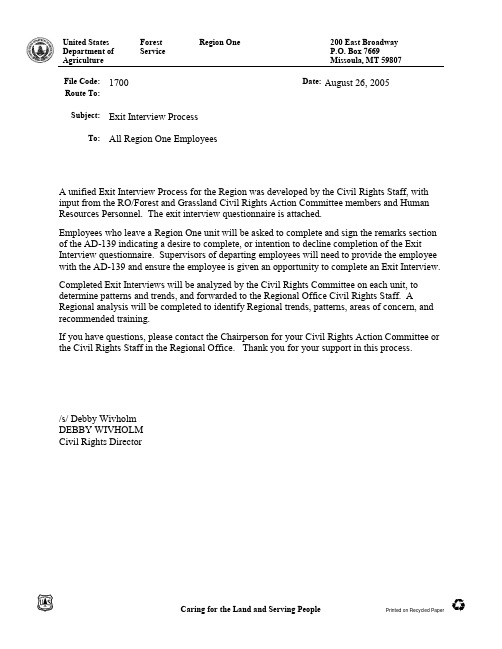
United States Department of Agriculture ForestServiceRegion One 200 East BroadwayP.O. Box 7669Missoula, MT 59807Caring for the Land and Serving People Printed on Recycled PaperFile Code: 1700 Date: August 26, 2005Route To:Subject: Exit Interview ProcessTo: All Region One EmployeesA unified Exit Interview Process for the Region was developed by the Civil Rights Staff, with input from the RO/Forest and Grassland Civil Rights Action Committee members and Human Resources Personnel. The exit interview questionnaire is attached.Employees who leave a Region One unit will be asked to complete and sign the remarks section of the AD-139 indicating a desire to complete, or intention to decline completion of the Exit Interview questionnaire. Supervisors of departing employees will need to provide the employee with the AD-139 and ensure the employee is given an opportunity to complete an Exit Interview. Completed Exit Interviews will be analyzed by the Civil Rights Committee on each unit, to determine patterns and trends, and forwarded to the Regional Office Civil Rights Staff. A Regional analysis will be completed to identify Regional trends, patterns, areas of concern, and recommended training.If you have questions, please contact the Chairperson for your Civil Rights Action Committee or the Civil Rights Staff in the Regional Office. Thank you for your support in this process./s/ Debby WivholmDEBBY WIVHOLMCivil Rights DirectorEXIT INTERVIEWSThe Northern Region of the Forest Service has developed an Exit Interview Process to gather information on employee retention. The purpose of this program is to provide exiting employees with an opportunity to give feedback regarding their employment experience. Objectives are to improve the quality of current working conditions by identifying and correcting deficiencies and to reinforce positive conditions. We greatly appreciate you taking the time to complete this questionnaire so we can make these adjustments.Your candid and honest feedback is needed. Every attempt will be made to use your input in a confidential and professional manner. However, please understand that the PURPOSE of this Exit Interview Program is to identify issues in recruitment and the workplace and to address them. It is an informational tool to systematically overcome barriers to retention. If you wish to raise issues anonymously or in a different forum, ALTERNATE methods are available to you by contacting Debby Wivholm, Director of Civil Rights or Margie Irvine, Equal Employment Specialist.Name: (Optional) _________________________________________Type of Appointment: (Circle one)Temporary Permanent SCEPLength of Service (years): ___________________________________Title and Grade of Position: ___________________________________Unit Name (District and Forest or Grassland): ______________________Date of Separation: ___________________________________________Reason for Separation: (Circle one)Resignation (return to school) ResignationTermination (lack of work) ReassignmentRemoval OtherPlease rate each item from 0-5(0 meaning poor and 5 meaning high)If you answer below average on any of these, please use additional sheets and identify the question you are addressing and share as much information about your work situation as you feel comfortable doing. Your answers to these questions are valuable to us in making improvements for the future.The Beginning Poor Ave High1. Orientation to the job 0 1 2 3 4 5 NA2. Orientation to the community 0 1 2 3 4 5 NA The Job3. Effective use of your skills 0 1 2 3 4 5 NA4. Type of work 0 1 2 3 4 5 NA5. Too much work 0 1 2 3 4 5 NA6. Too little work 0 1 2 3 4 5 NA7. Work Schedule 0 1 2 3 4 5 NA8. Tools and equipment neededto work effectively 0 1 2 3 4 5 NA9. Emphasis on safety 0 1 2 3 4 5 NA10. Physical work environment 0 1 2 3 4 5 NA Supervisor: Rate the following aspects of relationship with your supervisor11. Received clear direction 0 1 2 3 4 5 NA12. Feedback on performance 0 1 2 3 4 5 NA13. Communication with supervisor 0 1 2 3 4 5 NA14. Accommodation of disability 0 1 2 3 4 5 NA15. Supervisor support fortraining opportunities 0 1 2 3 4 5 NA Other:16. Communication with peers 0 1 2 3 4 5 NA17. Acceptance as team member 0 1 2 3 4 5 NA18. Availability of trainingopportunities 0 1 2 3 4 5 NA19. Effectiveness of training 0 1 2 3 4 5 NA20. Promotional opportunities 0 1 2 3 4 5 NA21. Adequacy of benefits 0 1 2 3 4 5 NA22. Grade level appropriatefor work performed 0 1 2 3 4 5 NA 23. Recognition (awards) 0 1 2 3 4 5 NAThe Community you lived in24. Availability of adequate housing 0 1 2 3 4 5 NA25. Availability for education forchildren 0 1 2 3 4 5 NA26. Adequacy of childcare 0 1 2 3 4 5 NA27. Adequacy of eldercare 0 1 2 3 4 5 NA28. Availability of work forothers in your family 0 1 2 3 4 5 NA29.What are your primary reasons for leaving? (Please address all significant reasons thatcontributed to your decision to leave and numerically rank them, with 1 being the most significant reason. For example: personal or family reasons; career-related reasons; job satisfaction; location/living environment; job environment; working relationship withsupervisor, co-worker, or management; harassment)30.What do you like most about your current position?31.What would it take for you to stay or return?32.What would you suggest management do more of or change?33.Was the Zero Tolerance for Sexual Harassment explained clearly and supported on yourunit? If so, please describe how it was supported.34.Did you witness discrimination while you worked for this organization? If so, did youreport it? Did you know who to report it to? Was it handled to your satisfaction? How was it handled?35.Any additional comments:。
人力资源专业术语(中英文对照)
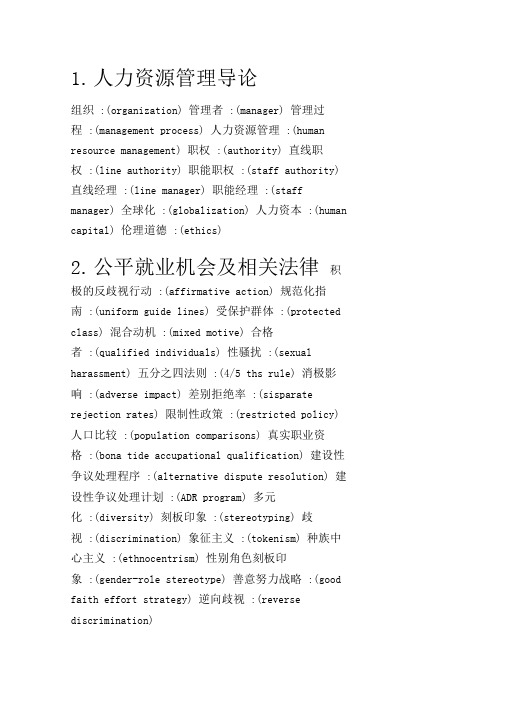
1.人力资源管理导论组织:(organization) 管理者:(manager) 管理过程:(management process) 人力资源管理:(human resource management) 职权:(authority) 直线职权:(line authority) 职能职权:(staff authority) 直线经理:(line manager) 职能经理:(staff manager) 全球化:(globalization) 人力资本:(human capital) 伦理道德:(ethics)2.公平就业机会及相关法律积极的反歧视行动:(affirmative action) 规范化指南:(uniform guide lines) 受保护群体:(protected class) 混合动机:(mixed motive) 合格者:(qualified individuals) 性骚扰:(sexual harassment) 五分之四法则:(4/5 ths rule) 消极影响:(adverse impact) 差别拒绝率:(sisparate rejection rates) 限制性政策:(restricted policy) 人口比较:(population comparisons) 真实职业资格:(bona tide accupational qualification) 建设性争议处理程序:(alternative dispute resolution) 建设性争议处理计划:(ADR program) 多元化:(diversity) 刻板印象:(stereotyping) 歧视:(discrimination) 象征主义:(tokenism) 种族中心主义:(ethnocentrism) 性别角色刻板印象:(gender-role stereotype) 善意努力战略:(good faith effort strategy) 逆向歧视:(reverse discrimination)3.人力资源管理战略与分析战略规划:(strategic plan) 战略管理:(strategic management) 使命陈述:(mission statement) 公司战略:(corporate-level strategy) 竞争战略:(competitive strategy) 竞争优势:(competitive advantage) 职能战略:(functional strategy) 战略性人力资源管理:(strategic human resource management) 战略地图:(strategy map) 人力资源计分卡:(HR scorecard) 数字仪表盘:(digital dashboard) 基于战略的衡量指标:(strategy-based metrics) 人力资源管理审计:(HR audit) 高绩效工作系统:(high-performance work system)4.职位分析与人才管理过程人才管理:(talent management)职位分析:(job analysis) 职位描述:(job description) 任职资格:(job specification) 组织结构图:(organization chart) 工作流程图:(process chart) 工作流分析:(workflow analysis) 业务流畅再造:(business process reengineering) 职位扩大化:(job enlargement) 职位轮换:(job rotation) 职位丰富化:(job enrichment) 工作日记/日志:(diary/log) 职位分析问卷法:(position analysis questionnaire) 标准职位分类:(standard occupational classification) 任务描述:(task statement) 职位要求矩阵:(job requirements matrix)5.人事规划与招聘人事规划:(workforce planning) 趋势分析:(trend analysis) 比率分析:(ratio analysis) 散点分析:(scatter plot) 任职资格条件库:(qualifications inventories) 人员替代图:(personnel replacement charts) 职位替代卡:(position replacement card) 马尔科夫分析法:(markov analysis) 继任规划:(succession planning) 员工招聘:(employee recruiting) 招聘产出金字塔:(recruiting yield pyramid) 职位空缺公告:(job posting)非常规性配员:(alternative staffing) 即时招聘服务机构:(on-demand recruiting services) 大学校园招募:(college recruiting) 求职申请表:(application form)员工测试与甄选疏忽雇佣:(negligent hiring) 信度:(reliability) 测试效度:(test validity) 效标关联效度:(criterion validity) 内容效度:(content validity) 构想效度:(construct validity) 期望图:(expectancy chart) 兴趣测试:(interest inventories) 工作样本:(work samples) 工作样本技术:(work samples technique) 管理评价中心:(management assessment centers) 情境测试:(situational test) 视频模拟测试:(video-based simulation) 小型工作培训和评价方法:(miniature job training and evaluation)7.非结构化面试:(unstructured interviews) 结构化面试:(structured interviews) 情景面试:(situational interview) 行为面试:(behavioral interview) 职位相关性面试:(job-related interview) 压力面试:(stress interview)结构化顺序面试:(unstructured sequential interview) 小组面试:(panel interview) 集体面试:(mass interview) 求职者面试顺序误差:(candidate-order or contrast error) 结构化情境面试:(structured situational interview)8.员工培训与开发新员工入职引导:(employee orientation training) 培训:(training)任务分析:(task analysis) 培训疏忽:(negligent training) 胜任素质模型:(competency model) 绩效分析:(performance analysis) 在岗培训:(on-the -job training) 学徒制培训:(apprenticeship training) 工作指导培训:(job instruction training) 程序化学习:(programmed learning) 行为塑造:(behavior modeling) 电子化绩效支持系统:(electronic performance support system) 工作助手:(job aid) 终身学习:(lifelong learning) 交叉培训:(cross training) 虚拟课堂:(virtual classroom) 管理技能开发:(management development) 职位轮换:(job rotation) 行为学习:(action learning) 案例研究法:(case study method) 管理游戏:(management games) 角色扮演:(role play)企业内开发中心:(inhouse development centres) 高管教练:(executive coach) 组织发展:(organization development) 控制实验:(controlled experimentation)9.绩效管理与评价绩效评价:(performance appraisal) 绩效评价过程:(performance process) 绩效管理:(performance management) 图评价尺度法:(graphic rating scale) 交替排序法:(alternative ranking method) 配对比较法:(paired comparison method) 强制分布法:(forced distribution method) 关键事件法:(critical incidentmethod) 行为锚定等级评价法:(behaviorally anchored rating scale) 目标管理:(management by objectives)电子化绩效监控:(electronic performance monitoring) 标准不清:(unclear standard) 晕轮效应:(halo effect) 居中趋势:(central tendency) 宽大或严格倾向:(strictness/leniency) 近因效应:(recency effect) 绩效评价面谈:(appraisal interview)10.员工保留、敬业度及职业生涯管理职业生涯:(career) 职业生涯管理:(career management) 职业生涯开发:(career development)职业生涯规划:(career planning) 现实震荡:(reality shock) 导师指导:(mentoring) 教练指导:(coaching) 晋升:(promotion) 调动:(transfer) 不服从上级:(insuboardination) 自由解雇:(terminate at will) 解雇面谈:(termination interview) 重新谋职咨询:(outplacement counseling) 离职面谈:(exit interview) 临时解雇:(lay off) 裁员:(down sizing) 解雇管理:(managing dismissals) 生命周期:(lifecycle career) 职业生涯管理:(career management) 职业锚:(career anchor)11.制定战略性薪酬计划员工薪酬:(employee compensation) 直接经济报酬:(direct financial payment) 间接经济报酬:(indirect payments) 职位评价:(job evaluation) 报酬要素:(compensable factores) 杠杆职位:(benchmark jobs) 职位排序:(ranking method) 职位分类法:(job classification or job grading) 职级:(classes) 职等:(grades)职位等级定义:(grade definition) 计点法:(point method) 市场竞争性薪酬系统:(market-competitive pay system) 薪酬政策线:(wage curves) 薪酬调查:(salary survey) 薪酬等级:(pay ranges) 比较比率:(compa ratios) 胜任素质薪酬:(competency-based pay) 宽带薪酬:(broad banding) 可比价值:(comparable worth)12.绩效薪酬和经济性奖励经济类奖励:(financial incentives ) 生产率:(productivity) 日公平工作标准:(fair day 's work) 科学管理运动:(scientific management movement) 可变薪酬:(variable pay) 期望:(expectancy) 关联性:(instrumentality) 效价:( Valance) 行为修正:(behavior modification) 简单计件工资:(straight piecework) 标准工时计划:(standard hour plan) 绩效加薪:(merit pay or merit raise) 年终奖:(annual bonus) 股票期权:(stock option) 团体或群体奖励计划:(team or group incentive plans) 组织绩效奖励计划:(organization-wide incentive plans) 利润分享计划:(profit -sharing plans)收益分享计划:(gainsharing plan) 收入风险型薪酬计划:(earnings-at-risk pay plans) 员工持股计划:(employee stock owership plan) 广泛股票期权计划:(broad-based stock option plans)13.福利与服务福利:(benefits) 失业保险:(unemployment insurance) 补充性薪酬型福利:(supple-mental pay benefits) 病假:(sick leave) 遣散费:(severance pay) 补充性失业福利:(supplemental unemployment benefits) 工伤保险:(worker 's compensation) 健康维护组织:(health maintenance organization) 自选医疗服务组织:(preferred provider organization) 团体人寿保险:(group life insurance) 社会保障:(social security) 养老金计划:(pension plans) 固定收益制计划:(defined benefit plans) 固定缴费制计划:(defined contribution plans) 可转移性:(portability) 储蓄节约计划:(savings and thrift plan) 延期利润分享计划:(deferred profit -sharing plan) 员工持股计划:(employee stock ownership plan) 现金金额养老金计划:(cash balance plans) 养老金担保公司:(pension benefits guarantee corporation) 提前退休窗口:(early-retirement window) 员工援助计划:(employee assistance program) 弹性福利计划:(flexible benefits plan)自助餐式福利计划:(cafeteria benefits plan) 弹性工作时间:(flextime)压缩工作周:(compressed workweek) 职位分享:(job sharing) 工作分享:(work sharing)14.伦理道德、员工关系管理伦理道德:(ethics)程序公平:(procedural justice) 分配公平:(distributive justice) 社会责任:(social responsibility) 网络欺凌:(cyberbullying) 组织文化:(organizational culture) 非惩罚性惩戒:(ninpunitive discipline) 解雇:(dismissal)员工关系:(employee relations) 建议团队:(suggestion teams) 问题解决团队:(problem-solving teams) 质量圈:(quality circle) 自我管理:(self-managing)15.劳资关系与集体谈判封闭型企业:(closed shop) 工会制企业:(union shop) 工会代理制企业:(agency shop) 工会会员优先企业:(preferential shop) 会员资格保持型企业:(maintenance of membership arrangement) 工作权利:(right to work)工会渗透:(union salting) 授权卡:(authorization cards) 谈判单位:(bargaining unit) 代表取消:(decertification) 集体谈判:(collective bargaining) 有诚意谈判:(good faith bargaining) 自愿性谈判主题:(voluntary or permissible bargaining items) 非法谈判主题:(illegal bargaining items) 强制性谈判主题:(mandatory bargaining items) 僵持:(impasses) 调解:(mediation) 实情调查员:(factfinder) 仲裁:(arbitration)利益仲裁:(interest arbitration) 权利仲裁:(rights arbitration) 经济罢工:(economic strike) 同情罢工:(sympathy strike) 野猫罢工:(wildcat strike) 反不当劳资关系行为罢工:(unfair labor practice strikes) 设置纠察:(picketing) 联合施压运动:(corporate campaign)联合抵制:(boycott) 内部游戏:(inside games) 闭厂:(lockout) 禁令:(injunction) 争议处理程序:(grievance procedure)16.员工安全与健康职业病:(occupational illness)传讯:(citation) 不安全工作条件:(unsafe conditions) 工作伤害分析:(job hazard ananlysis) 运行安全审查:(operational safety reviews) 行为安全教育:(behavior-based safety) 安全意识项目:(safety awareness) 工作倦怠:(burnout) 自然安全:(natural security) 机械安全:(mechanical security) 组织安全:(organizational security)17.全球化人力资源管理国际人力资源管理:(international human resource management) 工人理事会:(works councils) 外派员工:(expatriates) 母国公民:(home-country nations)第三国公民:(third -country nations) 虚拟团队:(virtual team) 民族中心主义:(ethnocentric) 多国中心主义:(polycentric) 全球中心主义:(geocentric) 适应性甄选:(adaptability scerrning) 国外服务补贴:(foreign service premium) 艰苦补贴:(hardship allowances) 迁移补贴:(mobility premiums)。
- 1、下载文档前请自行甄别文档内容的完整性,平台不提供额外的编辑、内容补充、找答案等附加服务。
- 2、"仅部分预览"的文档,不可在线预览部分如存在完整性等问题,可反馈申请退款(可完整预览的文档不适用该条件!)。
- 3、如文档侵犯您的权益,请联系客服反馈,我们会尽快为您处理(人工客服工作时间:9:00-18:30)。
EXIT INTERVIEW QUESTIONNAIRE离职问卷Introductory Note for Interviewer: Please emphasize that the interview is confidential and that the employee’s individual responses will not be released. Their results will be combined with those of other employees to better understand why people are choosing to leave the company. Because the interview is confidential, they should feel free to be as honest as possible in their responses.面谈者介绍性须知:请强调此面谈为机密,员工的个人回答将不被公开。
他们的结果将与其他员工的结果合并在一起,以更好地了解员工选择离开酒店的原因。
因为此面谈为机密,员工应排除顾虑,如实回答。
Date日期:Employee Name 员工姓名:Employee Background Data 员工背景资料:Department 部门Job Band 工作级别:Age 年龄:Gender 性别:Hire Date 雇佣日期:Date of Departure 离职日期:Name of Supervisor 主管姓名:Overall, how would you rate Our Hotel as a place to work? 总体上,作为工作的地方,你怎么认为本酒店?1.Terrible 很糟 4. Good 好2.Poor 差 5. Excellent 极好3.Average 一般 6. No Opinion/Don’t Know 无意见/不知道What were the negative or most frustrating aspects of your job?(check all responses that apply)你工作中负面或最受挫的方面是什么?(核对所有回答)1.Workload 工作量8. Lack of authority/empowerment 缺乏权利/授权2.Pay 薪水9. No opportunity for advancement 无提升机会3.Management 管理10. Limited training and development opportunities 培训和发展机会有限4.Supervisor 主管11. Lack of recognition 缺乏常识5.Co-workers 同事12. Corporate politics 公司内部争权夺利6.Job content/responsibilities 工作内容/职责13. Commute/Location 交通/位置7.Limited flexibility 缺乏灵活14. Too many policies and procedures 太多政策和程序Other 其他What was your main reason or reasons for leaving the company?(Check all responses that apply)你离开本酒店的主要原因或原因是什么? (核对所有回答)1.Better opportunity elsewhere 别处更好的机会8. Dissatisfied with work hours/workload 对工作时间/工作量不满2.Limited advancement opportunities 提升机会有限9. Lack of recognition 缺乏常识3.Limited training/development opportunities培训和发展机会有限10. Limited empowerment/anthority to perform job开展工作的授权/权力有限4.Better pay 更好的薪水11. Dissatisfied with supervision 对监管不满5.Better benefits 更好的福利12. Company direction and strategy 公司方向/策略6.Family responsibilities(includes childcare and relocation) 13. Stress 压力家庭职责(包括照顾孩子和搬迁) 14. Dissatisfaction with job/work responsibilities 对工作/工作职责不满7.Eldercare responsibilities 照顾老人的职责15. Commute/Location交通/位置Other(please explain) 其他(请解释)Under what conditions would you have considered staying with Our Hotel?在什么条件下,你会考虑留在本酒店?1.More money 更多薪水 5. More flexibility/telecommuting options更多适应性2.Better benefits 更好的福利 6. Better hours/workload 更好的工作时间/工作量3.Advancement opportunity 提升机会7. Improved supervision 提高监管4.Improved training and development opportunities提高培训和发展机会8. More company stability 更多公司稳定性Other 其他Would you consider returning to Our Hotels Group? 你会考虑返回本酒店集团吗?1.No 否2. Yes 是3. Maybe 可能Overall, how would you rate your immediate supervisor?(Probe for more information if response is a 3 or below)总体上,你怎样看待你的直接上司?(如回答为3或3以下,探究更多信息)1.Terrible 很糟 4. Good 好2.Poor 差 5. Excellent 极好3.Average 一般 6. No Opinion/Don’t Know 无意见/不知道If you rated your supervisor as average or below, please explain why. 若你认为你的上司一般或还要差,请解释原因:How would you rate the pay you received? (Note: pay includes base pay and annual incentives)你怎样看待你的薪水?(附注:工资包括基本工资和年度激励)1.Terrible 很糟 4. Good 好2.Poor 差 5. Excellent 极好3.Average 一般 6. No Opinion/Don’t Know 无意见/不知道Do you think your pay was competitive with the market? 你认为你的薪水可与行情竞争吗?1.Yes 是2. No 否What do you think about the benefits you received? 你怎么看待你的福利?1.Terrible 很糟 4. Good 好2.Poor 差 5. Excellent 极好3.Average 一般 6. No Opinion/Don’t Know 无意见/不知道Page 3 of 3第3页,共3页Do you think your benefits package was competitive with packages offered by other companies?你认为你的福利可与其他酒店提供的福利竞争吗?1.Yes 是2. No 否How would you describe your workload at Our Hotel? 你怎样描述你在本酒店的工作量?1. Too little to do 太少2. About right 正常3. Too much to do 太多Were you able to maintain a satisfactory balance between work life and personal life?你能在工作和私人生活中保持满意的平衡吗?1.Yes 是2. No 否If no, please explain 如不能,请解释:What is your opinion of the opportunities for advancement at Our Hotel? 你认为在本酒店的提升机会怎么样?1.Terrible 很糟 4. Good 好2.Poor 差 5. Excellent 极好3.Average 一般 6. No Opinion/Don’t Know 无意见/不知道How would you rate your opportunities for training and career development while at Our Hotel?在本酒店工作期间,你怎样看待你的培训和事业发展机会?1.Terrible 很糟 4. Good 好2.Poor 差 5. Excellent 极好3.Average 一般 6. No Opinion/Don’t Know 无意见/不知道Wrap-up 综述What comments do you have for management about how to make improvements in your work group, department, company? (Get specifics) 关于怎样提高你工作团体,部门和酒店的管理,你有何意见?(详述)What haven’t I asked you that I need to know about? 有什么我需要知道,还没问你的?Please return completed form toHuman Resources Department请将完整表格交回人力资源部Interviewed by面谈者:。
